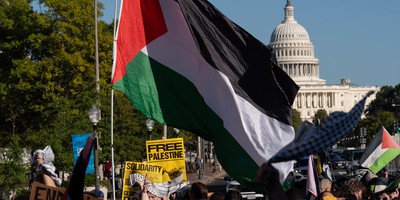She didn't have to die. And neither did her unborn children. Over the weekend, London newspapers reported on the 2007 suicide of 30-year-old Emma Beck, a young British artist who hung herself after the abortion of her twin babies. Perhaps the retelling of her suffering can prevent more needless deaths.
The agony and loneliness in Emma Beck's suicide note resonate across the pond, across racial and class lines, across generations. She was distraught over a breakup with her boyfriend, who didn't want the children. She was suffering intense grief from her decision to end the lives inside her. And so she ended her own.
"I should never have had an abortion. I see now I would have been a good mum," Beck wrote. "I told everyone I didn't want to do it, even at the hospital. I was frightened, now it is too late. I died when my babies died. I want to be with my babies -- they need me, no one else does."
Beck's family blames the medical establishment. The judicial system, as is so often the case, has become a coping mechanism. A British court recently held a hearing on Beck's suicide. Beck's mother revealed that her daughter "was not given the opportunity to see a counselor."
When a professional "counselor" can't be found, isn't that what mothers are for?
But it's not just jaded abortion providers and medical assistants, AWOL counselors and MIA parents who need to look in the mirror. We have tolerated a culture of callousness and nurtured an entitlement to convenience for decades. Feminists shush women with post-abortion regrets. Population control zealots and Planned Parenthood drum it into the heads of young women around the world: "The fewer, the merrier" and "Why carry more burdens?" their T-shirts and bumper stickers proclaim.
Last fall, in Emma Beck's homeland, the British press went gaga over an environmental nitwit who had an abortion and got her tubes tied to "protect the planet." She told the London Daily Mail: "Every person who is born uses more food, more water, more land, more fossil fuels, more trees and produces more rubbish, more pollution, more greenhouse gases, and adds to the problem of over-population."
Recommended
That came on the heels of a British think tank report on how children are bad for the environment. Said John Guillebaud, emeritus professor of family planning at University College London: "The effect on the planet of having one child less is an order of magnitude greater than all these other things we might do, such as switching off lights. The greatest thing anyone in Britain could do to help the future of the planet would be to have one less child."
And who gets premium op-ed space in America's newspaper of record to talk about abortion? Idiots like University of Iowa adjunct assistant writing professor Brian Goedde, who shared his festive thoughts surrounding the New Year's Eve before his girlfriend's abortion in an essay a few months ago in The New York Times. "The abortion is scheduled for two days from now, and we're holing up," he reminisced. "We do the dishes brush our teeth, climb into bed and have unprotected sex. 'I'm not going to get more pregnant,' Emily says. I've never felt pleasure more guiltily."
What you rarely hear are the voices telling you that such self-indulgence is wrong. What you rarely read are the stories of untold women (and men) around the world who know the vaunted choice they made was wrong and need help. What you rarely see are the studies showing that with abortion come lifelong costs and consequences -- high levels of post-traumatic stress disorder, depression, grief, ostracism, guilt and, in at least one study in Finland, higher suicide rates.
Delivering that message here in the United States are preventive groups like the National Institute of Family and Life Advocates (nifla.org), which donates ultrasound equipment and training to open up a "window to the womb" for women in crisis pregnancies, and post-abortion healing organizations like Silent No More (silentnomoreawareness.org). To combat abortion glorifiers, the Silent No More Awareness campaign makes the public aware that abortion is emotionally, physically and spiritually harmful to women and others; reaches out to women who are hurting from an abortion and lets them know help is available; and invites women to join us in speaking the truth about abortion's negative consequences.
What Emma Beck most needed to hear is the message abortion pushers most desperately want to drown out: You are not alone.

























Join the conversation as a VIP Member